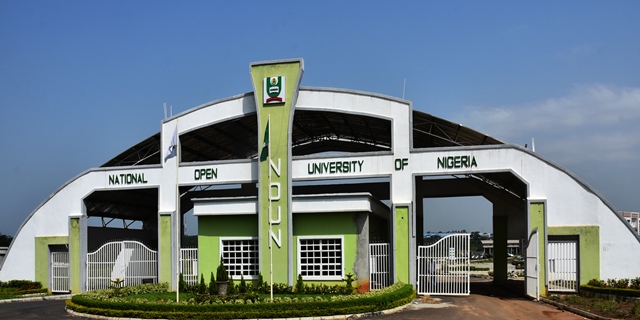I have heard it being said severally in different quarters that Nigerians are not smart. Validation came recently, and I shall explain.
As I speak to you now, all the universities in the entire West African Sub-Region are under lock and keys, except one – the National Open University of Nigeria(NOUN). Students of this university are engaging with their lecturers and other academic matters on their laptops, ipads, phones and other electronic devices sitting at the comfort of their homes, receiving lectures from, and interacting with their lecturers as well as and their classmates, via the learning platforms, asking questions on issues, submitting their assignments and even continuous assessment tests called tutor – marked assignments (TMAs) and almost instantaneously receiving feedback from one lecturer to the other- just by means of certain discreetly-manipulated electronic codes.

Incidentally, on the 3rd of April, 2020, in the heat of the coronavirus lockdown, I was shocked to read on the pages that the Federal Minister of Education, Mallam Adamu Adamu, was making frantic pleas to administrators of Nigerian universities to consider “virtual teaching” in the face of the current coronavirus pandemic and other deadly diseases bedeviling the globe. So I quickly asked myself “Is that not what the National Open University of Nigeria, NOUN, has been doing for 36 years and you deny them mobilization for the compulsory National Youth Service Corps (NYSC), and the mandatory course at the Nigerian Law School?”
Needless to say, without mobilization for the mandatory NYSC, and the Law School, the National Open University of Nigeria is as good as dead!
In the last few years, from 2016 to be precise, there had been a virulent backlash of some sort wherein the entire Nigerian public, with the exception of certain informed policy makers, had doubted the feasibility and quality of the programmes run by the university as well as its resultant products, despite billions of Naira that students plunge into the federal institution. Some sections of the Nigerian public even reprimanded the National Universities Commission (NUC) for granting it accreditation and called for the university’s proscription while hailing the likes of Harvard and Oxford many of whose programmes, unknown to them, are also delivered through the online Open and Distance mode. Nevertheless, some stakeholders had continued to assure the Government that, rather than kill the university by systematic refusal to recognize its products by way of denial to be mobilised for the NYSC and the Nigerian Law School programmes, it was better to strengthen and deepen the law establishing the university. This culminated in thorough debates, legislative committees’ conferences even on the floors of the National Assembly at both the Senate and House of Representatives levels as well as meticulous public hearings on the issues germane to the development of the university.

At first, the 8th Senate under Senator Bukola Saraki had expressed some pessimistic fears that a policy issue could not be resolved by mere petitions which had been the lot of the graduates of the university, but with the persistent pressures mounted by the current Vice Chancellor of the University, Professor Abdalla Uba Adamu. Much effort was put in place to ensure the law establishing the institution was amended.
This led to the passing into law of the National Open University of Nigeria (Amendment) Bill, 2018 which empowers the university to, among other things, introduce for the purposes of learning, any course of study in line with the National Universities Commission(NUC) Guidelines for Tertiary Education and the Nigerian University System(NUS) Curriculum, and pursuant to the Act of the National Assembly establishing it, to perform any other functions incidental to the Act. The Act was signed into law by Muhammadu Buhari, the President of the Federal Republic of Nigeria after a recommendation by the office of the Attorney-General of the Federation, AGF. Pursuant to Section 1(3)(c) and (d ) of the establishment Act, the university is now to be operated on a “full-time” basis, not part-time, with heavy funds having been deployed to equip the centres with advanced state-of-the-art technologies fashioned after, and comparable to, ones obtainable in the Open University-UK (OU) with active help and support from the Commonwealth of Learning, a network of universities around the world.
The interpretation of the above implies that the university is now comparable with University of Lagos or University of Port Harcourt or the Ahmadu Bello University. If graduates of Ahmadu Bello University were mobilised for the NYSC and the Nigeria Law School, the graduates of NOUN would also be mobilised. If the Universities were establishing Colleges or Faculties of Medicine, the NOUN can also do the same. NOUN is now a conventional university albeit with a touch of virtual and computer and information technology the likes of which has never been witnessed before in West Africa.
Noun, Social Distancing and the Council of Legal Education
One reads on Wikipedia that “Social Distancing” is a set of non-pharmaceutical interventions or measures taken to prevent the spread of a contagious disease by maintaining a physical distance between people and reducing the number of times people come into close contact with each other. The use of “virtual teaching” and invariably, distance learning, come in handy here.
First and foremost, one has to commend the Council of Legal Education, CLE, for its rigid and conservative stance in maintaining the standard and quality of lawyers produced at the Nigerian Law School since 1963, and for maintaining that law graduates of the National Open University of Nigeria should be first trained to be “fit and proper” before admittance to the Bar. Same goes for the Nigerian Bar Association, NBA, the Body of Benchers and the other stakeholders.
However, recent occurrences in the globe has changed many things and there is a lot that the Council of Legal Education, CLE, can learn from the operational mode of NOUN. As I speak to you now, the Nigerian Law School has shut down all its offices due to the Coronavirus pandemic, but virtual work and lectures have continued in NOUN despite the pandemic, since the students continue to remotely receive their lectures and even write, submit and receive their test marks online. In NOUN, Board and Council meetings are on-going online, while other Federal institutions are cancelling theirs. This is not good for the economy, social progress and development of the country. Is it not feasible to allow these institutions to visit NOUN to learn from them firsthand how this “virtual teaching” is done, analyse the beneficial eco-social issues it raised, and then go back to their own institutions to replicate same, so as to safeguard for future occurrences?
Firstly, NOUN is 36 years old in this business. NOUN was established in 1983, making it 36 years old in the operation of Virtual Education. She restarted in 2002, making it 18 years of unbroken services to the people of Nigeria.
It is said that the problem with NOUN is not the Open and Distance Learning, ODL, mode of teaching and learning but the conservative and rigid nature of CLE policy which is not in tune with deployment of technology in modern-day education. But who is at the receiving end now? The answer is “the country.” It goes without saying that most universities in the West are not totally under lockdown because technology has been deployed to ensure that students and their tutors continue to have virtual interactions using video and textual objects, having preempted circumstances such as we are in at the moment.
This cannot affect quality in any way as it equals face-to-face interactions without physical contact using advanced technology. It also helps students and teachers to acquire more skills for Research and Development (R&D) as older students who are not acquainted with the use and application of computers are forced to have a working knowledge of the devices. In the near future and with the wave of Artificial Intelligence Technologies on course, such persons would become fit for any work environment across the globe. Is it not apt that this would lead to a more versatile and productive knowledge economy?
There are recent testimonies all over the world, of the usefulness and efficacy of modern technology in not just the theoretical abs ratification or study of law but also the practice of law today. Just this week, international tabloids broke the news of the groundbreaking breakthroughs in justice administration and delivery in the Kenyan Judiciary when, as at 3rd of March, 2020, Justice Hannah Okwengu of the Kenyan Judiciary was said to have delivered 57 judgments and rulings of the Court of Appeal via internet video links owing to, and engendered by, the coronavirus pandemic lockdown. All decisions rendered were said to have been made available on the eKLR website within the next 48 hours.
In the case of NOUN, development has become a never – ending phenomenon. The Chairman, Governing Council of NOUN, Prof. Peter Okebukola had earlier this year inaugurated an intensive capacity building programme approved for staff by the Council to be led by NOUN’s World Bank-funded Africa Centre of Excellence for Technology-Enhanced Learning (ACETEL).
A unique capacity development scheme for all categories of staff has also been approved at the Centre and at the University level. This is to ensure that all staff are well tooled for the rapidly developing world of Open and Distance Learning, ODL, and place NOUN in the frontline of highly technology-driven institutions of its kind in the world. The university is poised to continue in its leadership role as the flagship in African ODL and provide a diversity of courses that will appeal across all the geopolitical zones of the country, thus fulfilling its statutory mandate of ensuring that Nigerians have access to flexible and equitable education.
The university has also signed many symbiotic partnerships in major efforts to ensure the continuation of its internationalization drive and evidence of the capacity of the university to act as a virtual educational hub in Africa for other institutions and countries seeking the best infrastructure to deliver ODL for students and teachers, and equally useful in the face of deadly contagious diseases like the coronavirus ravaging the world today.
-Bode Osanaiye is a Corporate Affairs Consultant
 National Telescope national telescope newspaper
National Telescope national telescope newspaper



